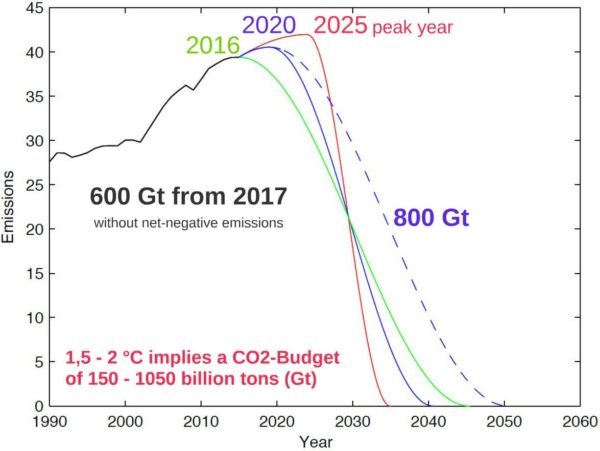Environment & Energy
Related: About this forumWhy global emissions must peak by 2020
"Not only will these impacts get progressively worse as warming continues, but our planet also runs a growing risk of crossing critical tipping points where major and largely irreversible changes to the Earthsystem are triggered (see Fig. 1)."

"The West Antarctic Ice Sheet (WAIS in Fig. 1) has likely already been destabilised, committing the world to at least three meters of global sea-level rise in coming centuries[iv] – an outcome that scientists have warned about since the 1970s[v]. The Greenland Ice Sheet – holding enough ice to eventually raise global sea levels by seven meters – may likewise be destabilised below 2°C[vi]. Coral reefs have suffered pan-tropical mass bleaching in 2016 and are doing so again in 2017 as a result of warming oceans, and only if global temperature stays well below 2°C some remnants of the world’s coral reefs can be saved[vii]. The Gulf Stream system (THC in Fig. 1) appears to be already slowing[viii] and recent research indicates it is far more unstable than previously thought.
"Because overall global temperature rise depends on cumulative global CO2 emissions, the Paris temperature range can be translated, with some uncertainty, into a budget of CO2emissions that are still permissible. This is the overall budget for the century and it lies within the range of 150 to 1050 Gt of CO2, based on updated numbers from IPCC[ix]. At the current global emission level of 39 GtCO2 per year, the lower limit of this range would be crossed in less than four years and is thus already unachievable without massive application of largely unproven and speculative carbon dioxide removal technologies. Even the CO2 budget corresponding to the mid-point of this uncertainty range, 600 GtCO2, is equivalent to only 15 years of current emissions. Fig. 2 illustrates three scenarios with this budget and different peaking years for global emissions. It makes clear that even if we peak in 2020 reducing emissions to zero within twenty years will be required. By assuming a more optimistic budget of 800 Gt this can be stretched to thirty years, but at a significant risk of exceeding 2°C warming.
"It is still possible therefore to meet the Paris temperature goals if emissions peak by 2020 at the latest, and there are signs to show we are moving in that direction as global CO2 emissions have not increased for the past three years. We will need an enormous amount of action and scaled up ambition to harness the current momentum in order to travel down the decarbonisation curve at the necessary pace; the window to do that is still open[x]."

http://www.realclimate.org/index.php/archives/2017/06/why-global-emissions-must-peak-by-2020/
Binkie The Clown
(7,911 posts)Meaning simply that we may have already crossed critical tipping points that make it too late to do anything to save civilization.
Canoe52
(2,949 posts)And that might be what we have here.